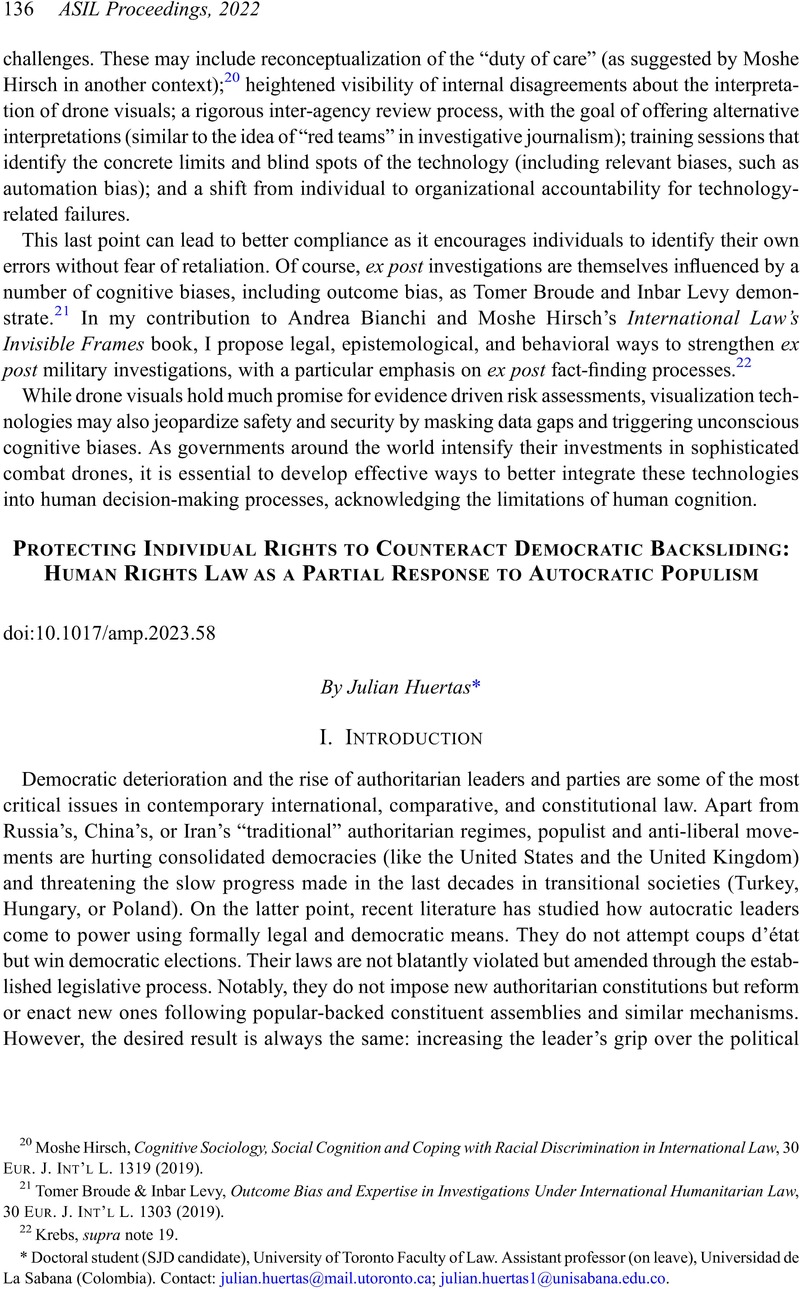No CrossRef data available.
Published online by Cambridge University Press: 24 March 2023

1 As recalled by Scheppele, the central autocratic, populist figures in recent history have only been male leaders. Kim Lane Scheppele, Autocratic Legalism, 85 U. Chi. L Rev. 545 (2018).
2 Id.; David Landau, Abusive Constitutionalism, 47 U.C. Davis L. Rev 189 (2013).
3 Tom Ginsburg, Authoritarian International Law?, 114 AJIL 221 (2020); Tom Ginsburg, Democracies and International Law (2021).
4 Ran Hirschl, Opting Out of “Global Constitutionalism,” 12 L. & Ethics Hum. Rts. 1, 8–12 (2018).
5 These include stronger and more fine-tuned enforcement of constitutional clauses, mainly by international actors. Vicki Jackson and Rosalind Dixon have questioned this idea as a form of “extra-territorial constitutional interpretation.” Rosalind Dixon & Vicki C. Jackson, Constitutions Inside Out: Outsider Interventions in Domestic Constitutional Contests, 48 Wake Forest L. Rev. 149, 154–56 (2013). Moreover, some have even proposed the creation of a global constitutional court. Landau, supra note 2, at 255.
6 Constitution of Venezuela, Art. 267.
7 The CORJS applied Article 40, part 4, of the Venezuelan Judiciary Career Act, which provides that “judges shall be removed from office . . . [w]hen they have incurred in grave inexcusable judicial error.” See Apitz Barbera et al. (“First Administrative Court”) v. Venezuela, para. 192 (IACtHR Aug. 5, 2008).
8 The Court cited Article 12 of the Basic Principles, which reads: “Judges, whether appointed or elected, shall have guaranteed tenure until a mandatory retirement age or the expiry of their term of office, where such exists.”
9 The IACtHR cited Principle I.3 of Recommendation No. R (94) 12, adopted by Council of Europe Committee of Ministers to Member States on the Independence, Efficiency and Role of Judges.
10 Apitz Barbera et al. (“First Administrative Court”) v. Venezuela, supra note 7, para. 45.
11 The Latimer House Guidelines can be found here: https://thecommonwealth.org/sites/default/files/news-items/documents/LatimerHousePrinciplesPH7Jul17.pdf.
12 According to the Office of the Comptroller, López violated, among other provisions, Articles 113.7 and 113.5 of the Organic Law of the Comptroller General of the Republic and the National System of Fiscal Oversight.
13 The Inter-American Court cited five cases of the European Court in support of those requirements: for the “adequately accessible” requirement, it cited Hasan and Chaush v. Bulgaria (2000) and Malone v. The United Kingdom (1984). For “sufficient precision,” it cited Maestri v. Italy (2004), Malone v. The United Kingdom, and Silver and Others v. The United Kingdom (1983). And for the third requirement (the law must be “foreseeable”), the Court cited Landvreugd v. The Netherlands (2002). López Mendoza v. Venezuela, Merits, Reparations, and Costs, para. 199 (IACtHR, Sept. 1, 2011).
14 The Court cited ECtHR's Landvreugd v. The Netherlands, Judgment of 4 June 2002 para. 59. López Mendoza v. Venezuela, supra note 13, para. 199.
15 Granier et al. (Radio Caracas Television) v. Venezuela, Preliminary Objections, Merits, Reparations and Costs, para. 179 (IACtHR June 22, 2015).
16 Id., paras. 197–99.